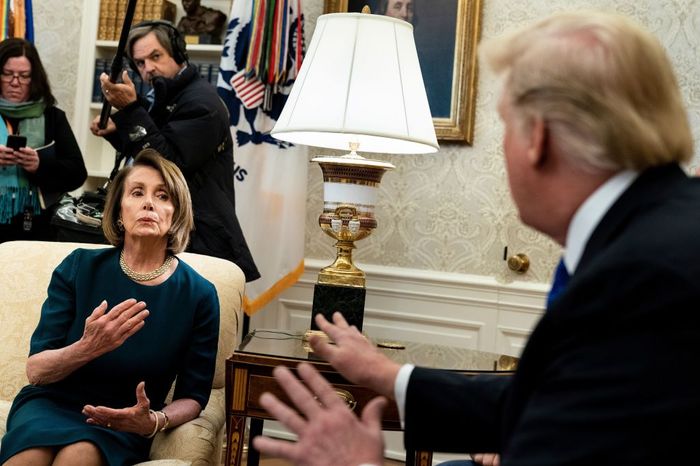
The anticlimactic denouement of the Mueller report produced a mixture of relief and gloating for Republicans. For President Trump it also produced something else: an almost intoxicating sense of impunity, a realization that his attempts to cultivate Russia as an ally, and largely successful efforts to gain control of the Justice Department, gave him carte blanche to plan his next crime. In June, he announced on television that he would accept dirt on his opponent from a foreign government if offered it again. He dispatched his lawyer to Ukraine to deliver the message that he demanded an investigation of his leading Democratic rival, and that he would use the powers of his office to leverage this end.
It is primarily because Trump is indicating that his war on democratic norms will not end that Congress is barreling toward impeachment right now at astonishing speed. On Monday morning, the headline on Politico’s story on House Democrats began, “Reluctant Democrats Weigh Impeachment.” By evening, as more reporting poured in, it had changed to “Dems Moving to Condemn Trump as Impeachment Fever Grows.”
The most important impediment to impeaching Trump has always been the reluctance of the most vulnerable House Democrats to take a vote that they feared would alienate their constituents. But all the signs are now pointing toward those Democrats’ throwing aside their reluctance. Seven newly elected freshmen Democrats from vulnerable districts have published an op-ed in the Washington Post demanding Trump hand over the suppressed complaint from an intelligence whistle-blower regarding Trump’s pressure on Ukraine. “If these allegations are true,” they write, “we believe these actions represent an impeachable offense.”
House Speaker Nancy Pelosi has urged restraint out of a desire to insulate those vulnerable members, whom she needs to preserve her majority. Pelosi’s behavior, too, has shifted notably. Her close ally Rosa DeLauro issued a statement demanding the entire whistle-blower’s complaint and opening the door to impeachment. The Post reports Pelosi is sounding out members on impeachment, and “many leadership aides who once thought Trump’s impeachment was unlikely now say they think it’s almost inevitable.”
It is possible Trump could defuse impeachment by releasing his block on the whistle-blower complaint. But surrendering his claims of secrecy and almost unbounded executive privilege run counter to his instinct for domination. It could also quite likely supply evidence incriminating enough to lead to his impeachment anyway. That Trump pressured Ukraine to investigate Biden and held up military aid to leverage this demand is a certainty. The main possibilities for surprise are that the complaint will include even more unseemly behavior.
The politics of this maneuver are highly uncertain. Whatever their motive, Democrats are not seeking political advantage, and there is a distinct possibility that proceedings will backfire on them. Despite Trump’s unpopularity, strong majorities have opposed impeachment throughout his term.
But there is at least some reason to believe the politics of the Ukraine scandal will play out differently than the politics of the Russia scandal. The Republican phalanx of support has failed to materialize in its usual strength. Normally passive Mitt Romney issued a surprisingly sharp rebuke, demanding Trump “should make available the whistleblower complaint that has been deemed to be credible and urgent,” and that if not, “it will be up to the House to decide how to proceed.”
Other signs of discomfort in the party are more subtle. The normal mouthpieces of the party line, while tonally in support, are refusing to outright defend his actions in Ukraine. “If POTUS called on a foreign nation to investigate Biden, it was inappropriate,” writes Ari Fleischer. The Wall Street Journal editorial page scolds, “What we know of the call underscores Mr. Trump’s greatest flaw as President, which is his political narcissism. Every decision boils down to how it affects him or his re-election prospects. Other Presidents have made similar calculations, but Mr. Trump lacks the basic filter to know when he is crossing a line that creates trouble for himself or the country.” Both Fleischer and the Journal then quickly pivot to the allegedly greater sins of the Democratic Party, but their reliance on whataboutism and inability to muster any plausible defense of the president’s actions ought to alarm him.
Even more tellingly, Senate Majority Leader Mitch McConnell declined to defend Trump’s coercion of Ukraine, or even to repeat his attacks on Biden, but instead made a tepid complaint that Democrats “have chosen to politicize the issue.” It is probably relevant that Trump was defying the wishes of Republicans themselves by refusing to allow the military aid to Ukraine that Congress had passed to go through. Trump personally ordered the aid to be held up, the Washington Post reports. McConnell may or may not care that Trump is abusing his power to smear Biden, but he surely cares that Trump is abrogating laws passed by McConnell.
The House will probably vote soon to make clear its intention to impeach Trump unless he hands over the full whistle-blower complaint. Perhaps he will do so, and perhaps it will not incriminate him. What seems more likely now is a prospect that had appeared remote just days ago: The House of Representatives will hold impeachment proceedings for President Donald Trump.






























